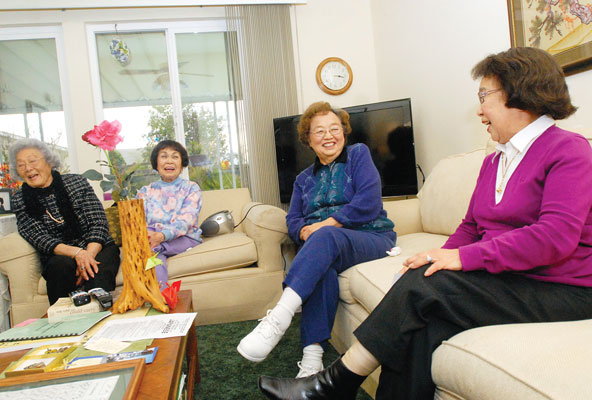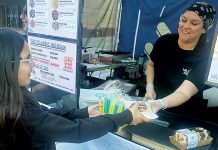
Betsy Hatakeyama and three of her closest friends met as
children and graduated from the same high school, but were forced
into internment camps and went their separate ways. But now they
are reunited, meeting regularly to reminisce about the lifetimes of
unique experiences they’ve shared.
Betsy Hatakeyama and three of her closest friends met as children and graduated from the same high school, but were forced into internment camps and went their separate ways. But now they are reunited, meeting regularly to reminisce about the lifetimes of unique experiences they’ve shared.
These women hover around the age of 86. They are second-generation Japanese-American citizens.
Along with another friend who lived in Gilroy until last year, they, their families and siblings spent about a year in forced internment camps in Arizona during World War II, when the U.S. government rounded up all people of Japanese descent in a fearful response to the 1941 bombing of the Pearl Harbor U.S. Naval base.
There was a time they saw each other every day, growing up together and attending school in Salinas as children. That’s when they first became friends, and they have only become closer since then.
Now, Hatakeyama, of Morgan Hill, and her friends meet for a weekend every time one of them celebrates a birthday, a tradition recognized for about the past 15 years. Prior to that, they went decades without seeing each other while they drifted to different parts of the state and took care of their respective families.
But they still treat each other as though no time has passed between meetings.
At their most recent gathering in late February, they met at Hatakeyama’s house on Fountain Avenue in Morgan Hill to celebrate the 87th birthday of Janet Yoshioka Tabata, who now lives near Willow Glen. Tabata said she recently renewed her driver’s license for five more years.
“I have to think twice before I ride with you,” laughed Grayce Tokunaga of San Jose, as the friends gathered around Hatakeyama’s living room coffee table, half planning what movie they were going to see that Friday night and half distracted by their own excitedly shifting conversation and laughter.
“We laugh a lot (when we get together),” Tabata said. “Laughing is good for your health. No wonder we’re so healthy.”
Indeed. The women clearly remember being packed into hot, uncomfortable trains en route to their indefinite, involuntary detention authorized and enforced by the U.S. government in 1942. The camps were surrounded by barbed wire and sentry towers. Hatakeyama remembers scorpions, rattlesnakes and “great big bugs” swarming the Arizona desert camp where she and her family spent a year.
“We were frightened to death,” Hatakeyama said.
Since then, they have returned to the South Bay area and raised families. Their children and grandchildren are successful. They have been to nightclubs and casinos in Reno, Nev., taken dream vacations to Europe, and seen, “The rock and roll guy, what’s his name?” Tokunaga temporarily forgot The King, Elvis Presley.
Planting the seeds of longevity
Hatakeyama does tai chi martial arts Thursday afternoons at the Morgan Hill Buddhist Community Center.
Nobi Dorothy Hamai volunteers at Watsonville Community Hospital and the Salvation Army. She also plays Bingo, is an avid gardener, and is a member of a gym near her home in Watsonville.
“Nobi got us into gardening,” said Tokunaga, who plays golf when her son comes to visit her. She also sings in the choir at the San Jose Buddhist Church.
Tabata tends about a half-acre of citrus fruit trees on her property in Willow Glen.
A fifth member of their group, Marianne Ogawa, used to live in Gilroy and attended these celebratory gatherings until last year, when she moved near Livermore to be closer to her children.
Ogawa is Tokunaga’s older sister, and had just started college in Los Angeles when the U.S. government’s detention policy started.
The siblings eventually moved to Gilroy with their parents, who thought about returning to their home city of Hiroshima, Japan before it was flattened by an atomic bomb in 1945.
Instead, they became U.S. citizens and bought a 10-acre ranch on Foothill Avenue, where they grew strawberries, Tabata said.
“They were there about 10 years and then retired,” she said. “None of us wanted to work on the farms anymore.”
The women joked that Japanese-Americans were the only farmers in Santa Clara County who grew strawberries. “People said they didn’t have any strawberries during the war because only the Japanese grew strawberries, and they were all gone,” Tokunaga laughed.
Shortly after their graduation from Salinas High School, in December 1941, the Japanese air force bombed the U.S. Naval base at Pearl Harbor, Hawaii. President Franklin Roosevelt issued executive order 9066 early in 1942, giving the military broad powers to create domestic “exclusion zones” where no people of Japanese descent were allowed, even if they were American citizens. Virtually the entire state of California was classified as such a zone.
The five friends woke up one morning and saw notices posted at the local Japanese market in Salinas and on telephone poles, announcing “instructions to all persons of Japanese ancestry.” The Japanese-American people were to report to the Salinas rodeo grounds, which the U.S. government turned into one of many “assembly centers” scattered throughout the West. From these centers, the 100,000 prisoners were sent to 10 massive internment camps in the Southwest.
Hatakeyama, her friends, and their parents and siblings, were sent to two camps on an Indian reservation in Poston, Ariz. – “the hottest place imaginable,” Hatakeyama said.
They were there about a year, but they still couldn’t return to California.
“When we were told we could leave the camps, we couldn’t leave fast enough,” recalled Hatakeyama. “I went to Chicago. People there were unbelievably nice. My goal was to work for the government. I passed the civil service test and worked for the Department of the Interior.”
By 1945, Hatakeyama was married and raising her family in Fresno. When her husband retired more than 30 years later, they moved to Morgan Hill.
Success achieved
At her home, Hatakeyama still has a vase made out of the gnarled trunk of what she thinks was a mesquite tree – made by hand in the Poston internment camp she was in. Also while interned, Hatakeyama’s mother carved ornamental wooden songbirds, about one inch in length, hand painted in intricate detail.
The men in the camp grew vegetables, and the women made decorative floral arrangements out of wildflowers.
And these women’s lifelong friendships aren’t the only relationships that survived the internment intact.
“Janet has a boyfriend,” Tokunaga teased.
The conversation drifted, as it does repeatedly with the women, almost with a gravitational force, to their children and grandchildren. Tabata talked about her daughter, who was born premature and with a handicap that left her bound to a wheelchair her entire life until she died at the age of 49. Despite her handicap, Tabata’s daughter learned how to use her feet to write proficiently, operate computers and even play basketball. She was the subject of newspaper articles while she was alive.
Betsy Hatakeyama was married to her husband, Yoneo, for 60 years before he died at the age of 91 a couple of years ago. Their son, Jon Hatakeyama, is a Morgan Hill dentist who is highly active in local youth sports fundraising activities. And his son is currently working on an advanced degree in chemical engineering and plans to get married in September.
“All our children did well,” said Hamai, who now lives in Watsonville. “My daughter teaches school. My granddaughter works with autistic children. I have another granddaughter in Japan (who is) teaching.”
One of Tokunaga’s sons lives in Atlanta, Ga., where he works for a Christian youth organization. Another son teaches psychology at San Jose State University.
Eventually the birthday girl chimed in, “I want to talk about my boyfriend.”
The couple were together in the Arizona detention center. When they were released they went their separate ways and married people they met later in life. Both their spouses are deceased, and the two reconnected recently.
“He’s such a nice person,” Tabata said. “He calls me every day.”
Even while spending a Friday afternoon together and knowing they had the rest of the weekend to share each other’s company, the friends were already looking forward to their next planned get-together in April in San Jose’s Japantown. Ogawa’s birthday is in June, so another party will likely be planned around that time.
“It feels like a family,” Hamai said.









